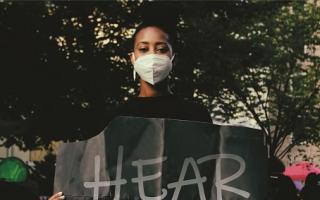
Our youth. Raising your voice.
The country's youth (those aged between 15 and 34) makes up a significant portion of the population and they have the potential to effect positive change. This was put on full display on 16 June 1976. On Youth Day, we commemorate this date when over 20 000 students protested against the apartheid government. They successfully challenged an order that Afrikaans would become the medium of instruction for their education. Those students raised their voices against the injustices they faced and the entire world took notice. Today, some of the ways in which the youth can raise their opinions and concerns are through protest action, as well as voting in elections.
Section 17 of the Constitution protects the right to assemble, demonstrate, picket and to present petitions. This includes protests in the form of gatherings in a public place, such as in front of a building or in the streets, in order to raise opinions and awareness about a certain cause. In recent years, the #FeesMustFall movement and various Gender Based Violence protests are examples of the youth raising their voices.
Although the youth is allowed to protest under the Constitution, this right is not unconditional. The Constitution specifically adds a condition that protests must be done unarmed and peacefully. Protests are further regulated by the Regulation of Gatherings Act 205 of 1993, which sets out the procedures to be followed to ensure safe and legal protests. Where a protest will include 16 or more persons, the following procedures must be followed:
> A person must be appointed to be in charge of the protest (“convenor”). The convenor must also appoint persons (known as marshals) to ensure that the participants of the protest follow the law.
> The convenor must give written notice to the local municipality containing the details of the protest, such as the purpose of the protest, the place where the protest will be held, the date and time of the protest, the anticipated number of participants and so on.
> The notice must be given not later than seven days before the protest. However, if the notice is given within 48 hours of the protest, the protest may be prohibited.
> Once the notice is received, the local municipality will conduct checks and balances to ensure that the protest will not pose any harm to the participants or the surrounding community. The local municipality can either respond with a notice that the protest can take place or they can call a meeting with the convenor to discuss any concerns. If the convenor is not called to a meeting within 24 hours after the notice has been given, the protest is considered to be approved.
Participants of a protest have the following rights and responsibilities:
Rights
> Gather freely with any person/group.
> To be protected against harm.
> To lay criminal charges against anyone who commits a criminal offence, for example, assault.
> To lay complaints against the misconduct of any authority.
Responsibilities
> Ensure that the protest remains peaceful and unarmed, for example, to not use any dangerous weapons.
> Obtain consent from the owner if the protest is on private property.
> Ensure that the relevant requirements are met.
> Ensure that emergency buildings are not blocked, for example, hospitals.
While protest action signals dissatisfaction very loudly, it is not the only way that the youth can exercise their power to create change. The youth can exercise their constitutional right to vote in elections. Local government elections take place every five years to elect office-bearers such as councilors and mayors in different provinces, districts and metropolitans. This year, the local government elections will take place on 27 October 2021.
Voting can be seen as a civic responsibility and anyone 18 years and older is allowed to vote. In order to vote in the upcoming local elections, a person must be registered in their residential area. Voter registration dates are normally announced closer to the election. Voters need to only register once, unless they relocate within South Africa, and a valid identity document is required to register. The youth is encouraged to vote for their preferred candidates and continue to hold them accountable after their election.
Youth month is a time to reflect on the courage shown by the class of 1976. They raised their concerns and opinions the only way they knew how, making way for today's youth to be able to raise their voices in many other ways, including legal protest and voting in democratic elections. Protest action and voting, while they may seem far removed from one another, can go hand-in-hand and are available to the youth of today to raise their opinions.
Did you know…There are certain procedures to follow when planning a protest.